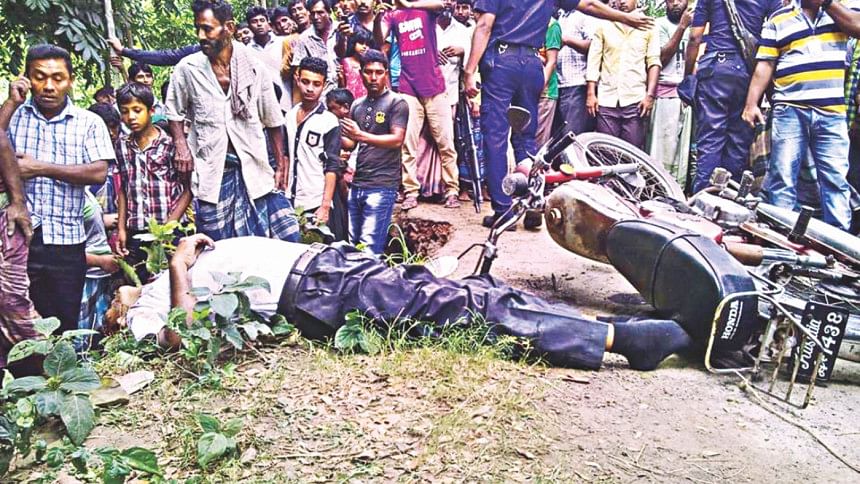Machete attack kills 1 in Kushtia

Machete-wielding assailants have struck again, this time killing a homeopath and critically injuring a university teacher in Kushtia yesterday.
It comes six days after an elderly Buddhist monk was hacked to death inside a temple in the hilly district of Bandarban.
It is not clear who carried out the attack and why, but police said it bore the hallmark of the ongoing attacks on freethinkers, secular and online activists, academics, bloggers, writers, publishers, minorities and people of different ideologies by suspected militants.
The dead is Sanaur Rahman, 60. He died minutes after the attack.
The injured is Saifuzzaman, 42, an assistant professor of Bangla at Islamic University in Kushtia. He is in critical condition with injuries in his shoulder, neck, chest and hands. He was brought to Dhaka by an air ambulance and was admitted to the Apollo Hospitals. Doctors will operate on him today or tomorrow.

The two were good friends, partly because of their common interest in Baul philosophy.
Three youths aged between 25 and 30 intercepted the two at a secluded place at Bottoil near Sadar upazila around 10:45am when they were going to Sanaur's village home on a motorbike.
The assailants forced them to get down from the vehicle and hacked them repeatedly. The attack lasted less than a minute and the assailants left the scene on a motorbike on which they came, police said, quoting witnesses.
Police recovered a machete from the spot.
Locals said Sanaur was an ardent lover and promoter of Baul philosophy. Known to the villagers as Sana Daktar (doctor), he gave free treatment and homeopathy medicine to the poor for free.
Among colleagues, Saifuzzaman is also known as a secular and progressive-minded person. Only in January, he returned home after completing his PhD on Baul philosophy from Kalyiani University in India.
This is not the first time that a university teacher or a Baul devotee came under attack.
On April 23, suspected militants hacked to death a Rajshahi University professor, AFM Rezaul Karim Siddiquee, near the campus.
Earlier on January 8, homeopath Jamiruddin Khaza was similarly killed in his dispensary in Jhenidah. He was known to be a devotee of the great mystic Lalon Shah.
Islamic State took credit for his murder, according to US-based SITE Intelligence Group, which monitors global terror activities.
Another follower of Baul philosophy, Prof AKM Shafiul Islam of Rajshahi University, was hacked to death near the campus in November 2014.
Including yesterday's victim, at least 12 people have been hacked to death in similar fashion so far this year. The IS took credit for several of these attacks, but the government insists the terror group has no presence in the country.
About yesterday's attack, Kushtia police Superintendent Proloy Chisim said it resembled those carried out in recent months. “We are investigating if any militant group is involved.”
But police would also look into other motives such as property or treatment-related issues, he added.
‘DOCTOR FOR THE POOR’
Every morning, poor people from near and far would gather at Sanaur's home at Mazampur for free treatment and medicine, which Sanaur would happily give.
He also gave financial help to many ultra poor people, according to locals and family members.
To them, his was a progressive mind enlightened by Baul philosophy.
He kept himself busy with social development work and for the wellbeing of the poor so much so that he sold much of his ancestral property for the cause, said Obaidur Rahman, a relative.
He would treat patients from morning till afternoon, and in the evening he would arrange Baul songs, accompanied by friends and admirers.
People from nearby areas would also come.
“We see nothing wrong in his love for Baul music. He used to give us free treatment,” said an elderly man of Shishirmath village.
Pavel Raihan, Sanaur's only son, said, “My father was a man who loved to help the poor. He was an outspoken and a progressive man.”
Pavel studies at a private university in the capital and his mother died three years ago.
Friends and locals said they were not aware of any threat on Sanaur's life, but religious fanatics in the area often criticised him for his love for Baul philosophy.
Saifuzzaman, father of a five-year-old daughter, joined the university upon his master's in 2006. Later he went to India to do his PhD on Baul philosophy and their beliefs.
Sources said he was involved with Shapla Forum, a pro-Awami League teachers' organisation, and Bangabandhu Parishad.
Prof Saidur Rahman, a colleague at the department, said Saifuzzaman was a quiet person and would always speak about peace.

 For all latest news, follow The Daily Star's Google News channel.
For all latest news, follow The Daily Star's Google News channel. 



Comments